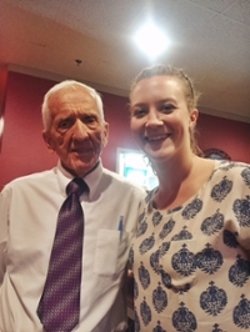Immigration Court, USAID Reports, and Dr. T. Colin Campbell
After a couple weeks of working on tedious documents, fixing Bengali-English translations, and battling Word document formatting, I have finally compiled and edited the 80+ page report that will be sent to and published by USAID for Bangladesh's Justice for All Program.
This was the longest/biggest assignment I've had since being here, and although it was draining at times to be on the computer for so many hours, it feels like a great accomplishment to be done. In reading the different district reports from Bangladesh, it is clear that their judicial system has improved but still needs a lot of work. Specifically, women still are extremely disadvantaged in Bangladesh, having a patriarchal society that expects women to stay at home and not speak out against their husbands. Improving judicial access for women and other disadvantaged persons will be a main focus going forward, and the program NCSC has implemented with USAID has definitely improved the situation. In the US, we often take for granted our system, quick to point out its flaws; however, when writing this report, it became clear that in other countries such as Bangladesh, accessing the judicial system may seem futile, with many not knowing they even have legal rights and a large percentage not knowing they have access to free legal aid. After compiling the USAID 2016 report, I also edited another 80+ page report written by Nielsen Corporation that summarized the Bangladesh program and synthesized the data that was gathered over the last year.
Yesterday, I had the privilege of going to the Arlington Immigration Court. This past semester, my former Criminal Law Professor, Paul Marcus, brought Judge Snow down from Arlington to speak to a group of students about his work and how he became an Immigration Judge. I reached out to Judge Snow after he spoke, knowing I would be in this area this summer, and he invited me to sit in on preliminary proceedings yesterday.
I walked to the second floor where the 8 courtrooms are located, and immediately, I saw dozens of children and families all waiting in the lobby and looking nervous. I cannot imagine being in a different country having to go through a judicial process that I am not accustomed to. I sat in the packed, small courtroom for about 2 hours as detainees were broadcasted onto a TV screen from either Farmville Jail or the VA Peninsula Regional Jail. It was strange to see detainees being in court while not really being in court. Most detainees did not speak English, and the entire proceedings cannot be translated or it would get too confusing and convoluted. Instead, Judge Snow summarized it at the end while a translator translated to the detainees what happened and what would happen next. Judge Snow was kind enough to switch the camera around to show the seating area when he knew families of detainees were present in the courtroom. During the last case of the morning, one woman and her daughter were in the front pew, and the toddler kept shouting "Papa" as she noticed her father on the screen - the mother was in tears and silent. Many of these immigrants do not have the means to travel to the two jails, so seeing their loved ones on the TV screen was as close as many have been in months. Judge Snow is a very fair judge; it was clear that he took every aspect of the people's lives into account, whether it was their upbringing, past criminal history (or lack thereof), work ethic, and their access to a support system.
I had the chance to speak with Judge Snow afterwards, talking about the process, the hardships of this line of work, and about his past work. He explained that only a small percentage of the people in immigration court proceedings are detained, but because they are far away in the two jails, the most efficient way to handle proceedings for detainees is to use the video-conference system.
Last night after work, I drove to Herndon to have dinner at Greenfare to hear from one of my biggest idols - Dr. T. Colin Campbell (author of The China Study). It was through a documentary he contributed to, Forks Over Knives, that changed my life and view on health last year, and it is one of the reasons I am so concerned about the environment and the devastating effects the animal agriculture industry has on it. He found the link between animal protein (specifically casein) and cancer, discovering that you could turn cancer "on" or "off" by increasing or decreasing the amount of animal protein consumed. He also found that in China, those that lived in the longest were the ones who ate mostly plant-foods (whole grains, vegetables, legumes, fruits) and consumed little to no animal protein; those people had the lowest rates of death and cancer was almost nonexistent in those areas of the society.
I got to meet so many like-minded people, while having a delicious plant-based dinner and dessert. I just purchased one of his most recent books, "Whole," and I brought it with me to ask him to sign it. He was kind enough to do so. I am in love with the NOVA/DC area because there are always things to do. There are countless events I can go to where I meet new people and have easier access to like-minded people. I definitely want to intern in this area next summer, and hopefully will be based out of this area in the future while being able to travel for work.
